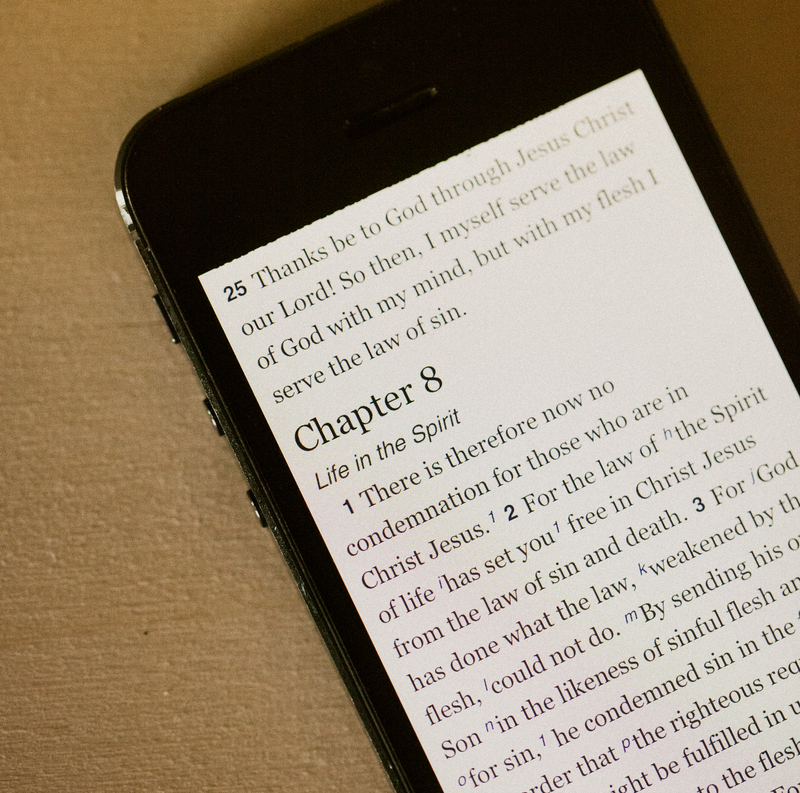“We're going to make some history together today.”
Those were the words the late Steve Jobs, founder and CEO of Apple, spoke 10 years ago this week when he introduced the first version of the iPhone. At the time, smartphones—cell phones that operate as mobile computing devices—had been around for nearly a decade. But Jobs’s boastful claim proved to be prescient, and the iPhone sparked a revolution in the use, innovation, and mainstream adoption of smartphone technology.
As with most every tool, ubiquitous use brings a plethora of problems. Technology has a way of shaping our values and our culture—often in ways in which we remain blissfully unaware. Christians must therefore think critically about how smartphones affect us, both on the individual level and also as a community of believers.
Yet in watching out for the pitfalls of technology we should not overlook the ways that smartphones can be useful for spiritual formation. Here, for instance, are seven ways you can use your smartphone to enhance your spiritual life:
1. Read God’s Word
Being able to conveniently carry around God’s Word wherever we go is one of the greatest benefits of having a smartphone. Most likely, though, you mainly use the app when you forgot your print Bible or when you need to look up a particular verse. But Bible apps can be used in a variety of useful ways, such as when your Bible reading plan includes chapter readings from multiple books (as with Prof. Horner's Reading System).
When I used that system with a printed version of the Bible I spent nearly as much time flipping through the text and keeping track of the 10 bookmarks as I did in reading the Scripture passages. The app makes the process much simpler and more convenient, thus helping me to stick with the multiple-chapter daily reading approach.
Recommended resources: YouVersion’s Bible App (which includes the Prof. Horner Reading Plan)
2. Listen to God’s Word
Listening to audio Bibles can increase your Scriptural intake and help you to catch nuances in the text that you might miss in your readings. A couple of decades ago you’d need to spend several hundred dollars for dozens of cassettes or CDs. Today, you can download free apps that have excellent recordings of God’s Word that you can listen to anytime on your smartphone.
Recommended resources: ESV Bible app, NIV The Listener's Bible
3. Memorize God’s Word
When it comes to memorizing Scripture, the key is repetition and recitation. Use your calendar app or an app that allows you to schedule texts to yourself to send the verse you want to memorize at a predetermined time during the day.
An alternate approach is to copy the verse or passage on your note app and set a (silent) alarm to send reminders throughout the day to stop and work on memorizing the passage.
There are also several apps, such as ScriptureTyper, that can help make the process of memorization easier.
Recommended resources: TextItLater, ScriptureTyper
4. Be ready to share God’s good news
A lot of the anxiety we have about evangelism is due to our insecurities about being able to share the gospel or answer questions from unbelievers. You can alleviate some of this stress by preparing a document in your note-taking app that includes a clear explanation of the gospel (there’s no shame in reading it aloud until you have it memorized), a few relevant Bible verses, and answers to common questions and objections to the Christian faith. Having this document as a quick reference can keep you feel more confident about sharing God’s good news.
You can also create a folder in your Kindle app that includes the books you find most helpful in explaining or defending the faith. Then, when there is a passage from a book that you think would be useful for a new believer, you can pull out your phone and share it with them directly.
5. Schedule some encouragement
Too often our friends and family need words of encouragement when we are unable to be with them or give them our direct attention. A simple way to close this gap is to use a scheduling app to send a text message with words encouragement or relevant Bible verses right before they are needed (such as when a church member is heading to the clinic for a chemotherapy treatment).
Recommended resources: Delayd, Text Timer
6. Pray through your social media feeds
Smartphones have made it possible to fill the time we used to “waste” waiting in lines at the bank or checkout line. Now we can use those short spurts of time to scroll through Facebook or Twitter. But skimming through social media can be more than a form of distraction; we can use it to look for unspoken needs of those in our networks.
Next time you’re stuck waiting, scroll through your follower or friends list and use it as a prompt to say a quick prayer for people you usually don’t include on your prayer list.
7. Create your own audio Bible commentary
Almost every smartphone has a built-in app that let’s you record audio (i.e., iPhone’s Voice Memos). This can be a useful tool for helping you capture your thoughts about Scripture. For example, you can start with creating summaries of Bible books (they don’t need to be theologically detailed, just something that will aid your understanding). Start with simple summaries, such as “Leviticus: About the ceremonial law” or “Proverbs: The wise sayings of Solomon.” Later, you can refine and replace them with versions by Biblical scholars (e.g., Joshua: God gave the land he promised and Israel took it (11:23; 21:43-45). — Liam Goligher)
You can also made audio recordings of your thoughts and insights after your daily Bible reading. By labeling and organizing them by chapter and verse, you can easily create commentaries and study tools to help you remember what you’ve learned (and recording audio helps you to capture the thoughts quickly when you don’t have time or energy to write them down).
Editors’ note: Some material in this article is adapted from Joe Carter’s latest work, the NIV Lifehacks Bible: Practical Tools for Successful Spiritual Habits (Zondervan, 2016).
Free Book by TGC: ‘Before You Lose Your Faith’
 Many young people are walking away from Christianity—for reasons ranging from the church’s stance on sexual morality, to its approach to science and the Bible, to its perceived silence on racial justice.
Many young people are walking away from Christianity—for reasons ranging from the church’s stance on sexual morality, to its approach to science and the Bible, to its perceived silence on racial justice.
TGC’s book Before You Lose Your Faith: Deconstructing Doubt in the Church is an infusion of hope, clarity, and wisdom in an age of mounting cynicism toward Christianity.
For anyone entering college or the workplace and looking for a timely reminder of why Christianity is good news in a skeptical age, make sure to get your FREE ebook Before You Lose Your Faith today!


































